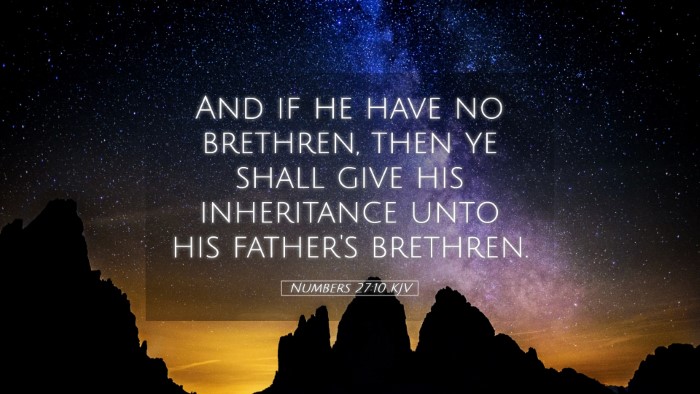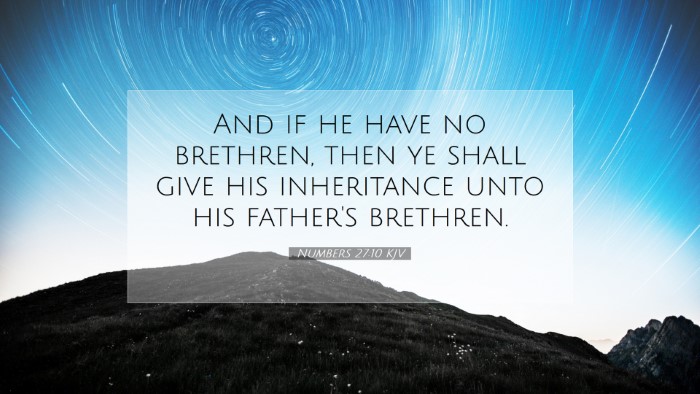Bible Commentary on Numbers 27:10
Verse: "And if he shall have no son, then ye shall transfer his inheritance unto his daughter."
Context and Setting
This verse appears within the larger narrative of Numbers, where God sets forth laws concerning inheritance and the rights of women in Israelite society. This illustrates a shift and development in the socio-cultural framework of the time, whereby women are granted rights to inheritance, which was revolutionary compared to ancient Near Eastern norms.
Key Themes and Insights
- Justice in Inheritance: This directive seems to reflect God’s concern for social equity and justice. Public domain commentaries like that of Matthew Henry emphasize that God does not overlook the needs of individuals based on gender.
- God's Provision: Albert Barnes highlights that God's laws are designed to ensure that each family is cared for, showcasing divine provisions whereby inheritance does not become a tool of oppression or neglect.
- Role of Women: The inclusion of daughters in inheritance rights signifies a divine acknowledgment of women’s value in society. According to Adam Clarke, this promotes the development of their roles as heirs and productive members in society.
Comprehensive Analysis
1. Historical Context: At the time of this pronouncement, the Israelites were on the verge of entering the Promised Land, and establishing guidelines for land division was critical. The concern for proper inheritance aligns with God’s covenant promises.
2. Sociological Implications: The laws established in this chapter reflect not only a divine command but also progressive reform in the cultural context of ancient Israel. Women’s rights are affirmed, indicating a shift from patriarchal structures to a more inclusive approach.
3. Theological Significance: The theological underpinning is profound, as it implies God’s impartiality and desire for justice. This verse foreshadows future discussions in the New Testament regarding equality in Christ (Galatians 3:28).
Commentary Excerpts
Matthew Henry: In his commentary, he remarks on the necessity of this decree, particularly in the face of families without male heirs. He articulates how this provision serves to maintain property within the tribes of Israel and to uphold family honor.
Albert Barnes: Barnes points out that this was a pragmatic step in ensuring no inheritance fell into the hands of outsiders. He notes that such measures were critical in preserving the tribal integrity and stability of Israel.
Adam Clarke: Clarke elaborates that this command was revolutionary as it placed women in a position of dignity and respect, which was rare in the ancient world. He argues that this reflects God's higher moral standards.
Practical Applications
- Understanding Inheritance: For pastors and theologians, this text serves as a reminder of the importance of equitable practices within the church and community. It encourages a commitment to justice and fairness.
- Women's Roles in Ministry: This verse can fuel discussions surrounding the role of women in modern faith communities. Theologically, it supports the idea that women are equally heirs in Christ.
- Divine Justice and Equality: The principle embedded in this verse speaks to God's inherently just nature and His commitment to uphold the marginalized, a truth relevant in various social discussions today.
Conclusion
Numbers 27:10 serves as a beacon of justice and inclusion in the Biblical canon, prompting believers to reflect on the implications for both ancient and modern societal structures. The insights derived from public domain commentaries illustrate the enduring principles of equity and divine justice, urging contemporary readers to advocate for similar values in their own circles.


